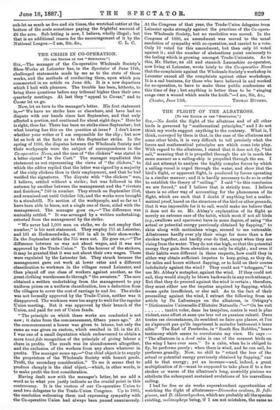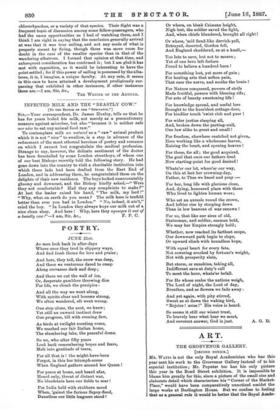THE FLIGHT OF THE ALBATROSS.
[To TEE EDITOR Or TIES "131110TATOR.." J Sis.,—No doubt the flight of the albatross and of all other birds is governed by "mathematical principles," and I do not think my words suggest anything to the contrary. What is, I think, conveyed by them is that, in the case of the albatross and some other birds, it is very difficult to tell precisely what the forces and mathematical principles are which come into play. With regard to the albatross, I stated that it does not fly, "but sail," meaning that it is propelled through the air in much the same manner as a sailing-ship is propelled through the sea. I did not attempt to analyse the highly complex forces by which a sailing-vessel is urged through the water, and show that the bird's flight, or apparent flight, is produced by forces operating in a similar manner ; and it is hardly necessary to do so in order to establish the theory of "sailing." I said "to this conclusion we are forced," and I believe that is strictly true. I believe there is no other way of accounting for the phenomena of its flight, which are such that I doubt if anything but a mathe- matical proof, based on the structure of the bird or other grounds, that it was impossible for it to sail, would make me believe that it does not do so. Mr. Abbey's explanation of its flight as merely an extreme case of the habit, which most if not all birds (e.g., swallows and sparrows) have in some degree, of using "the actual or potential energy previously obtained by flapping," to skim along with motionless wings, seemed to me untenable. Albatrosses hardly ever ply their wings for more than a few strokes together, and hardly ever do that, except when they are rising from the water. They do not rise high, so that the potential energy they gain from elevation can only be slight ; and even if their habits were different in these respects, how could they in either way obtain sufficient impetus to keep going, as they do, for miles and hours without flapping, or to hold on their course indefinitely against the wind ? They could not "toboggan," to use Mr. Abbay's metaphor, against the wind. If they could not sail, they would simply be blown backwards in any such attempt. But that they do proceed against the wind is certain ; therefore, they most either use the impetus acquired by flapping, which seems quite insufficient, or else sail. As to the fact of their proceeding against the wind, I extract the following from an article by Be Lafresnaye on the albatross, in Orbigny's " Dictionnaire Universelle d'Hietoire Natnrelle i"—" On lee voit tantot voler, dans les temp8tes, centre le vent Is plus violent, sans effort et sans que leur vol on paraisse ralenti. Dans toutes ces cireonstances, ils semblent ne faire quo planer, et Pon ne s'apergoit pas qn'ils impriment le moindre battement k lours gales." The Earl of Pembroke, in " South Sea Bubbles," bears testimony which seems to corroborate my view. He says ;— "The albatross in a dead calm is one of the meanest birds on the wing I have ever seen." In a calm, when he is obliged to fly, he performs poorly ; when there is wind, and he can sail, he performs grandly. Now, no skill to "retard the loss of the actual or potential energy previously obtained by flapping," can add to that energy; yet an increase—and, indeed, a great multiplication of it—must be supposed to take place if to a few strokes or waves of the albatross's long, unwieldy pinions we attribute the subsequent sustained evolutions of his marvellous Bailing.
I had for five or six weeks superabundant opportunities of watching the flight of albatrosses—Diomedea exulans, D. full- ginosa, and D. chlororhynehus, which are probably all the species existing, Inelanophrys being, if I am not mistaken, the same as cklororhynchus, or a variety of that species. Their flight was a frequent topic of discussion among some fellow-passengers, who had the same opportunities as I had of watching them, and I think I am right in saying that the conclusion generally arrived at was that it was true sailing, and not any mode of what is properly meant by flying, though there was more room for doubt in the case of the smaller species than in that of the wandering albatross. I formed that opinion at that time, and subsequent consideration has confirmed it but I am glad it has met with opposition, as it would be interesting to have the point settled ; for if this power of sailing is possessed by the alba- tross, it is, I imagine, a unique faculty. At any rate, it seems in this case to have attained a development prodigiously sur- passing that exhibited in other instances, if other instances there are.—I am, Sir, &a,
TIM WRITER OF THE ARTICLE.



































 Previous page
Previous page